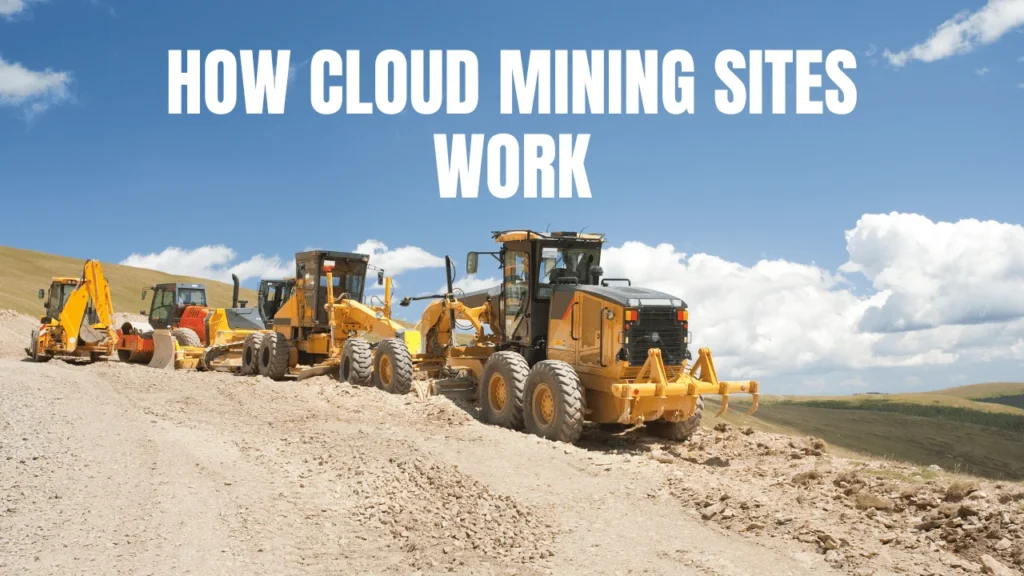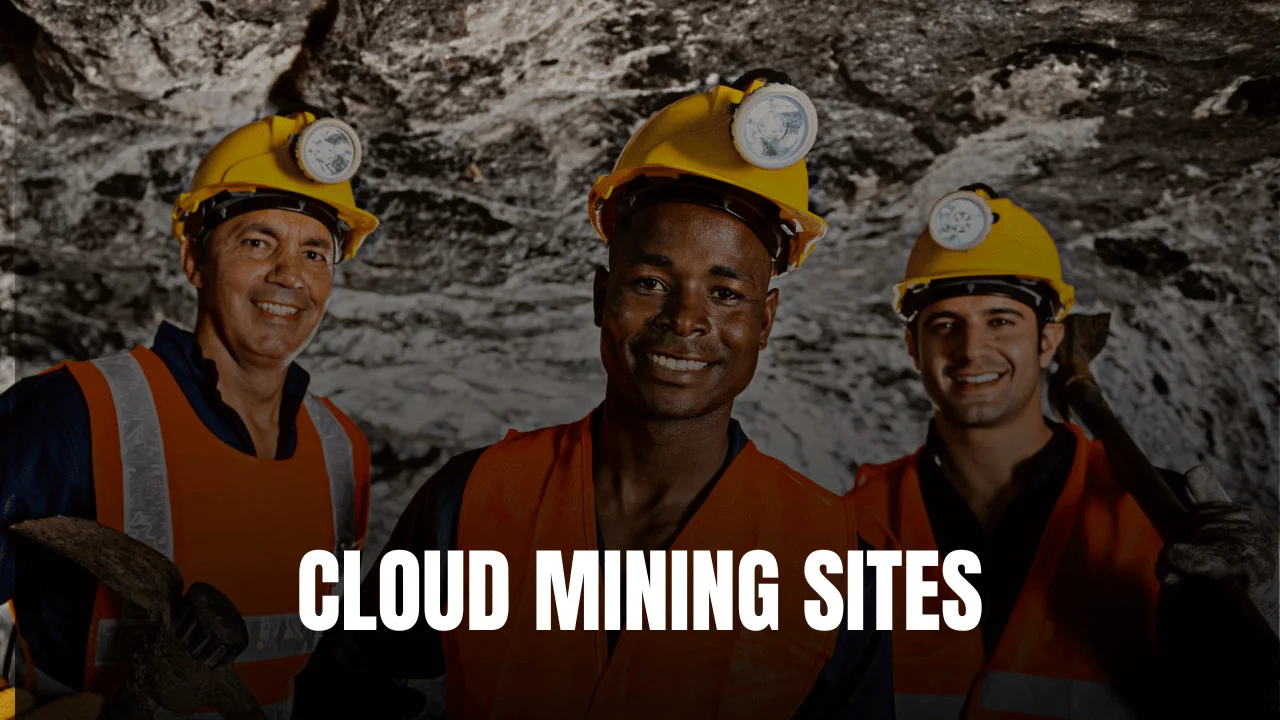Mining is a popular attraction for cryptocurrency investors and enthusiasts because it offers a potentially lucrative way to earn digital assets. However, mining has always necessitated costly machinery, expert knowledge, and constant operating expenses. Cloud mining sites have emerged as a viable alternative to physical hardware by providing platforms where individuals can purchase mining contracts. They make mining accessible to everyone, but are they really beneficial?
Understanding Cloud Mining Sites
A thorough understanding of the intricacies of this young industry is necessary for fully appreciating the benefits and dangers of cloud mining.
How Cloud Mining Sites Work

Users can rent or buy mining power from remote data centers through cloud mining sites. What usually is involved in the process is:
To begin, users sign up for a cloud mining platform, then select a mining plan that matches their needs in terms of hash power, coin type, and contract length.
When mining begins, the user’s chosen cloud mining service takes control of the hardware and begins to mine cryptocurrencies.
After deducting any service or maintenance fees, the user’s earnings are deposited directly into their wallet.
Purpose of Cloud Mining
Several demographics are drawn to cloud mining, including:
For those who are just starting out and don’t have any technical knowledge, there is a simple way to get into cryptocurrency mining.
Investors who prefer to sit on their hands and let digital assets grow in value are known as passive investors.
Worldwide, consumers include those whose homes are located in areas where mining is either heavily regulated or prohibitively expensive.
Cloud Mining vs. Traditional Mining
Several features stand out when contrasting cloud mining with conventional mining methods:
Money: Buying mining gear can be a significant outlay of capital, but cloud mining makes it unnecessary.
Knowledge of Technology: While cloud mining makes mining easier, traditional mining still requires knowledge of technology.
Independence: Unlike cloud mining, which relies on third-party services, physical mining gives miners complete independence.
Are Cloud Mining Sites Profitable in 2024?
Several things will determine whether cloud mining sites are profitable in 2024:
Mining profits are highly sensitive to changes in the price of cryptocurrencies.
Mining’s computational difficulty changes over time, which affects earnings.
Profitability is highly dependent on operational expenses such as maintenance fees and electricity costs.
Risks of Investing in Cloud Mining
The cloud mining industry has seen its share of challenges:
The anonymity of cryptocurrencies makes them a prime target for scam artists.
Some businesses don’t tell the whole truth when it comes to their profits and operations.
Mining operations, particularly those involving cross-border services, may be affected by jurisdictional regulations.
Top Cloud Mining Platforms

If they want to keep their investments risk-free, investors must find reliable cloud mining sites.
Genesis Mining
Genesis Mining, one of the first platforms, provides several contracts for various cryptocurrencies. It stands out for its customer service and transparency.
Hashflare
Hashflare is a well-liked Bitcoin mining platform that offers users customizable contracts and intuitive dashboards.
NiceHash
Although NiceHash isn’t technically a cloud mining service, it does let users rent hash power from other miners, which is great for smaller investments and gives them more flexibility.
Bitdeer
Bitdeer is a cryptocurrency exchange that offers a variety of mining contracts, a user-friendly interface, and dependable customer service.
ECOS
ECOS aims to reduce the complexity of mining for a wider audience with its intuitive mobile app and diverse investment options.
Key Considerations
Thorough research is necessary to choose the best cloud mining platform.
Contract Transparency
Before signing a contract, make sure the platform lays out all of the terms and conditions, such as fees, payout schedule, and mining time.
User Reviews
You can learn a lot about the platform’s dependability, customer service, and profitability from user reviews.
Security Measures
Respected websites should have stringent security measures in place to ward against fraud and hacking.
When significant financial investments are at risk, prompt and responsive customer support is essential for a smooth resolution of any problems that may arise.
Legal Compliance
Verify that the platform abides by all applicable laws and rules in both the user’s country and the platform’s jurisdiction.
Cloud Mining vs. Staking
As both mining and staking become more popular ways to earn cryptocurrency passively, enthusiasts frequently argue over which is better.
The Mining Model
In order to validate transactions, secure blockchain networks, and solve difficult cryptographic puzzles, computational power is utilized in mining. Important things to keep in mind are:
Major expenditures in hardware and power are necessary for mining.
Coins and transaction fees are the forms of reward that miners receive for their work.
The likelihood of earning rewards decreases as network difficulty increases due to competition.
The Staking Model
When you stake, you commit some of your cryptocurrency to a wallet in order to facilitate network operations like transaction validation. Take this into consideration:
In most cases, staking is less expensive than mining, lowering the barrier to entry.
Stakers can earn benefits from transaction fees and inflationary minting.
Staked coins may be subject to lock-in periods that restrict their liquidity.
Mining vs. Staking: Which to Choose?
There are a number of considerations when deciding between mining and staking:
Staking often requires less capital than mining, which requires a larger initial investment.
Mining calls for technical know-how, while staking is easier for the average person.
Staking, on certain networks, can provide more liquidity.
Cloud Mining Profitability Analysis
It takes a thorough analysis that considers many factors to determine whether cloud mining is profitable.
Cost Factors
Key costs affecting profitability include:
A cloud mining contract’s contract price is the amount paid in advance.
Regular charges for power, cooling, and hardware maintenance make up maintenance fees.
Delays in withdrawals caused by minimum payout limits can impact liquidity.
Revenue Factors
Changes in the value of cryptocurrencies have a direct impact on cloud mining profits.
The amount of data that could be mined is dependent on the processing power.
Increases in network difficulty can make it more difficult to mine new blocks.
Risk Mitigation Strategies
In order to increase their profits, investors should think about:
Contract Diversification: Distribute Risk Among Multiple Providers and Contracts.
Costs of Monitoring: Contracts with clear and fair pricing structures should be chosen.
Being Well-Informed: Monitor current market trends and make strategic adjustments as needed.
Remote Crypto Mining Operations
The advent of remote crypto mining operations has provided miners with unprecedented freedom and convenience, completely changing the industry.
Setting Up Remote Mining
In order to set up remote mining, you must do the following:
When deciding on a provider, look for one with honest and open pricing.
Providers may provide a range of hardware specifications for you to choose from.
Pick a mining program that works with the gear your service provider offers.
Monitoring Operations
Ensuring the smooth operation of remote mining operations requires effective monitoring:
Real-Time Dashboards: Numerous platforms provide the option to monitor mining performance through dashboards.
Warnings and Reminders: To keep track of your hardware’s health and mining output, set up alerts.
Reports on Performance: These reports are useful for keeping tabs on how profitable the business is.
Maintaining Security
Security measures are essential in remote mining:
To enhance the security of your account, enable two-factor authentication.
To avoid unapproved transfers, establish withdrawal limits.
Important Data and Wallet Keys Should Be Backed Up Regularly.
Bitcoin Mining Profitability Trends
You can learn a lot about the possible returns on investment in Bitcoin mining from trends in profitability.
Historical Profitability
After looking at how profits have changed over time, we find:
Markets in a Bull and a Bear: Mining profits are significantly affected by fluctuations in the price of bitcoin.
Reward Reductions: Profitability is impacted by Bitcoin’s supply-halving events.
Network Expansion: Miners become more competitive as the network expands.
Current Market Dynamics
Currently, there are market dynamics that impact profitability, such as:
Profit margins can be drastically altered by sudden changes in price.
Rising institutional investment has leveled off market volatility.
The mining industry may feel the pinch of increased energy prices.
Future Outlook
In order to forecast future profitability, it is necessary to evaluate:
New mining hardware can increase efficiency, thanks to technological advancements.
The mining industry may be affected by shifts in policies and regulations.
A boost to long-term profits could come from more people using bitcoin.
Frequently Asked Questions
Is Cloud Mining a Scam?
While some cloud mining sites are legitimate, others are not. Researching the company’s background and reading user reviews can help identify trustworthy platforms.
How to Choose a Cloud Mining Site?
Factors such as reputation, transparency, contract terms, and security measures should guide your decision.
What Is the Cost of Cloud Mining?
Costs include upfront contract fees and ongoing maintenance charges, varying by provider and contract type.
Can You Mine Altcoins on Cloud Mining Sites?
Yes, many cloud mining platforms offer altcoin mining contracts for popular cryptocurrencies like Ethereum and Litecoin.
What Are the Risks of Cloud Mining?
Risks include scams, unpredictable profitability due to market conditions, and the reliance on third-party services.
Also Read: Best Mining Website: Detailed Guide
Conclusion
Though cloud mining sites offer a thrilling chance to make cryptocurrency with little effort, they are not without their hazards. This innovative mining model has the potential to pay off for investors who put in the time and effort to learn about the platforms, comprehend the intricacies of mining economics, and evaluate their own risk tolerance.

Brandy Stewart, an enchanting wordsmith and seasoned blogger, weaves compelling narratives that transport readers to uncharted territories. Infused with perceptive viewpoints and dynamic storytelling, Doris exhibits a command of language that enthralls both hearts and minds, leaving a lasting mark on the literary panorama.

